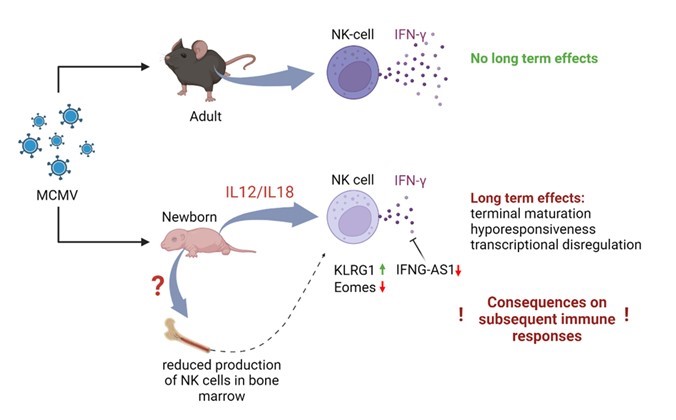The prestigious scientific journal Nature Communications published the paper titled Perinatal murine cytomegalovirus infection reshapes the transcriptional profile and functionality of NK cells by authors Carmen Rožmanić, Berislav Lisnić, Marina Pribanić Matešić, Andrea Mihalić, Lea Hiršl, Eugene Park, Ana Lesac Brizić, Daniela Indenbirken, Ina Viduka, Marina Šantić, Barbara Adler, Wayne M. Yokoyama, Astrid Krmpotić, Stipan Jonjić and Ilija Brizić.
Here is what the authors told us:
The Center for Proteomics has been successfully researching various aspects of viral diseases and immunity for years. At the same time, we especially focus on the research of the NK cell function. NK cells play a very important role in the immune system as they fight pathogens almost immediately after they enter our body, that is, upon infection. Considering their importance in fighting infections, it is not surprising that people who lack NK cells have difficulty fighting viral infections. Infections in newborns and children at an early age are often accompanied by complications and severe diseases, and one of the causes is a developmentally immature immune system.
We started this research with the question of whether there is a difference in the efficiency and activity of NK cells in early life and in adults. We have demonstrated that NK cells in adults are very efficient in eliminating viruses, unlike early-life NK cells. One of the reasons for the mentioned phenomenon is that the NK cell surface in early life lacks important molecules (receptors) that help NK cells detect viral infections. However, these studies also revealed that infection in early life leads to long-lasting impairment in NK cell functionality, which results in increased susceptibility to new infections later in life. Our results indicate that the impaired NK cell function results from inflammation caused by the inflammatory cytokine IL-18, to which NK cells are more sensitive in early life than in adulthood. Besides the direct impact on NK cells, the inflammatory response also negatively impacts the bone marrow, which is where the body produces new NK cells.
The research was conducted on experimental animals, but direct parallels were observed with the results of clinical studies that analyzed NK cells in newborns with cytomegalovirus infection, one of the herpesvirus infections. The research was almost entirely carried out at the Faculty of Medicine of the University of Rijeka, with the support of scientists from the Washington University in St. Louis, USA, the Ludwig Maximilian University of Munich, Germany, and the Leibniz Institute for Virology in Hamburg, Germany. The research was funded through the project by the Croatian Science Foundation and the Center of Excellence for Viral Immunology and Vaccines located at the Faculty of Medicine in Rijeka. Besides the project manager Ilija Brizić, PhD student Carmen Rožmanić, academician Stipan Jonjić, professors Berislav Lisnić and Vanda Juranić Lisnić and numerous other scientists of the Faculty of Medicine in Rijeka played a key role in conducting this research. This paper is a continuation of top research in basic immunology and virology, which has been carried out for decades at the Faculty of Medicine in Rijeka, and whose value was especially recognized during the last pandemic.

